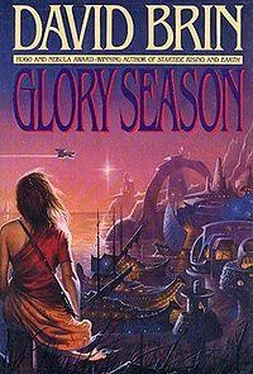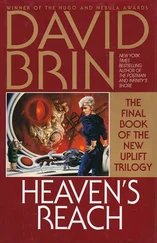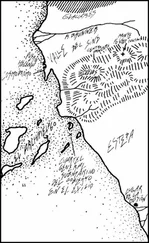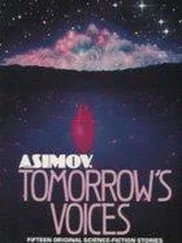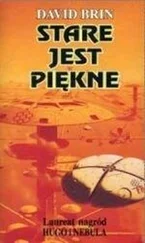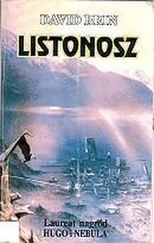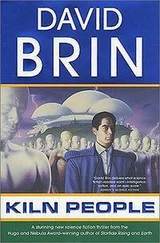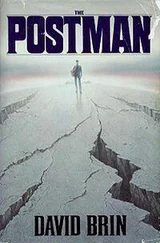On the lower part of Leie’s right leg, in a spot perfectly mirroring her own left, Maia saw a strip of new, pink scar tissue, healing neatly under the benign influence of sun, air, hard work, and saltwater.
Problem number one; lacking natural controls, our human descendants will tend to overbreed until Stratos can no longer support their numbers. Shall we then have come all this way to repeat the catastrophe of Earth?
One lesson we’ve learned—any effort to limit population cannot rest on persuasion alone. Times change. Passions change, and even the highest flown moralizing eventually palls in the face of natural instinct.
We could do it genetically, limiting each woman to just two births. But variants who break the programming will outbreed all others, soon putting us back where we started. Anyway, our descendants may at times need rapid reproduction. We mustn’t limit them to a narrow way of life.
Our chief hope lies in finding ways of permanently tying self-interest to the common good.
The same holds for our other problem, which provoked this coalition to drop half-measures, leaving the Phylum’s bland compromisers behind. The problem which drove us to this faraway world, seeking a lasting solution.
The problem of sex.
—from The Apologia,
by Lysos
Lanargh, their second port of call, was not counted among the chief cities of the world. Not in a league with those rimming the coast of Landing Continent. Still, the metropolis was big enough to give the twins pause after weeks evading icebergs on the high seas.
In Queg Town, the owners had found few buyers for Port Sanger coal. So the Zeus and Wotan wallowed with waves lapping high along their dented flanks. Whenever lookouts spotted floating isles of ice, auxiliary motors strained to alter course and miss the terrible white growlers. The wind was a fickle ally. Bosuns shouted and all hands heaved at balky sails. One jagged berg passed chillingly near Wotan ’s starboard withers—leaving Maia dry-mouthed and grateful they were convoying. In case of a mischance, only the Zeus was close enough to save them.
When they next neared shore, the former monotony of tundra had been replaced by stands of fog-shrouded conifers, giant redwoods whose ancestors had come to Stratos along with Maia’s, tortuously, from Old Earth. The terran trees liked the misty coast, encouraged by forestry clans in their slow, silent struggle with native scrub. Sinuous trails showed where harvesters had recently dragged cut logs, to be herded in great rafts to market.
Maia’s breath came short and quick as the Wotan finally rounded Point Defiance, where a famed stone dragon lay shadows of its broad wings over the harbor strait, symbolizing the protective love of Stratos Mother. Carved long ago, it honored the repulse, at great cost, of a landing force sent down by the Enemy foe ship, during dark, ancient days when women and men together fought to save the colony, their lives, and posterity. Maia knew little about that bygone era—history wasn’t deemed a practical curriculum—but the statue was a stirring sight nonetheless.
Lanargh’s famous five hills then appeared, one after another, lined with pale stone tiers, clanholds, and gardens, stretching for kilometers along the bay and into green-flanked mountainsides. The twins had always pictured Port Sanger as large and cosmopolitan, since its trade dominated much of the Parthenia Sea. But here, at the pivot of a vast ocean, Maia saw why Lanargh was properly called “Gateway to the East.”
After tying at the quay assigned them by the harbor mistress, the crew watched the captain set off with the Bizmai cargo-owners to meet potential clients. Then liberty was called and the hands themselves spilled ashore, shouting with pleasure. Maia found Leie waiting at the foot of the wharf. “Beat ya again!” Maia’s twin laughed, eking out another minor victory, knowing Maia didn’t give a damn.
“Come on,” Maia answered, grinning. “Let’s get a look at this place.”
More than five hundred matriarchal clans dwelled in the city, filling broad piazzas and clamoring market avenues with contingents of finely dressed, elaborately coiffed, magnificently uniformed clones, their burdens carried on well-oiled carts or the backs of patient lugars in liveried tunics. There were sumptuous scents of strange fruits and spices, and creatures the twins had only read about, such as red howler monkeys and flapping mere -dragons, which rode upon their owners’ shoulders, hissing at passersby and snatching grapes from unwary vendors.
The sisters roamed plazas and narrow shopping streets, eating sweets from a patissiere’s stall, laughing at the antics of a small clan of agile jugglers, dodging the harangues of political candidates, and pondering the strangeness of such a wide, marvelous world. Never before had Maia seen so many faces she didn’t recognize. Though Port Sanger held a population of several thousand, there had never been more than a hundred distinct visages to know while growing up.
For the first time, they tasted what life might be like if their secret scheme succeeded. Although they were humbly dressed, some vars they encountered stepped aside for them in automatic deference, as if they were winter-born. “I knew it!” Leie whispered. “Twins are rare enough that people simply jump to the wrong conclusion. Our plan can work!”
Maia appreciated Leie’s enthusiasm. Yet, she knew success would count on filling in countless details. They shouldn’t spend their free moments playing games, she insisted, but combing the port for useful information.
Unfortunately, the town was a babble of strange tongues. Whenever clone-sisters met on the street, they often spoke an incomprehensible rasp of family code, handed down by hive mothers and embellished by their daughters for generations. This frustrated Leie at first. Back in easy-going Port Sanger, common speech had been the norm.
Then Leie grew enthusiastic. “We’ll need a secret jarg too, when we start our own clan.”
Maia neglected to remind her sister that as little girls they had experimented with codes, cryptograms, and private jargon, until Leie grew bored and quit. Privately, Maia had never stopped making anagrams or finding patterns in letter blocks scattered on the creche floor. It might even have been what first triggered her interest in constellations, for to her the sparkling stellar patterns always seemed to hint at the Creator’s private code, one that was open to all who learned to see.
Strolling the grand plaza in front of Lanargh’s city temple, the twins watched a group of kneeling sailors receive blessing from an orthodox priestess wrapped in burgundy-striped robes. Raising her arms, the clergywoman called for intercession from the planet spirit, its rocks and air, its winds and waters, so that the men might reach safe haven at their journey’s end. The singsong benison finished with a favorite passage about the sanctity of comradeship amid shared danger. Yet, the holy woman’s quavering delivery showed that clerics, too, had a “language” all their own, especially when quoting the mysterious Fourth Book of Scriptures.
“Soto their ships ontime ofneed kaul uponthat whichishidden …”
No wonder Book Four was popularly known as the Riddle of Lysos. It even had its own eighteen-letter alphabet, which used to bring Maia pleasurable diversion during long weekly services in the Lamatia chapel, silently puzzling over cryptic passages incised on the stone walls.
Leie glanced at the clock set in the Temple’s face and sighed. “Oops, sorry. Gotta get back to work now.”
Maia blinked. “What? On first day?”
“Ain’t it var’s luck? Mop an’ pail duty. Our chief wants ol’ Zeus to get more customers than Wotan, even though it all goes to the same owners and guild.” She grimaced. “Are your bosuns as awful as ours?”
Читать дальше
